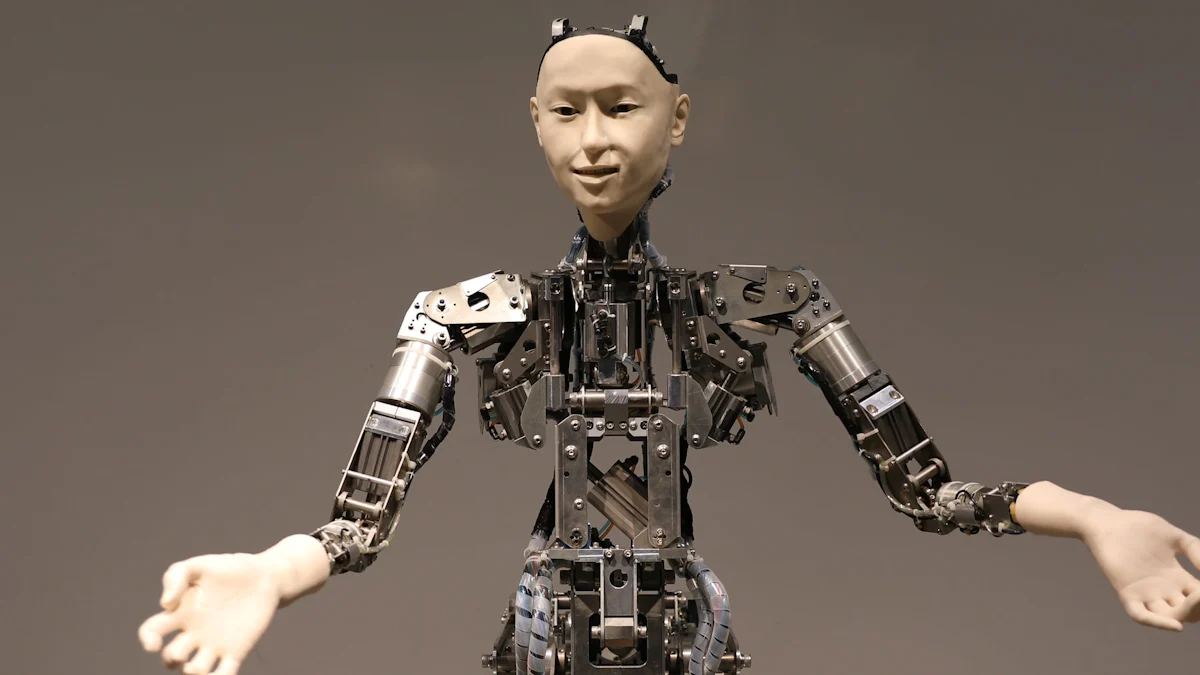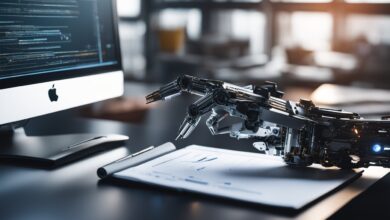AI’s Role in Transforming the Job Market Landscape

Artificial Intelligence (AI) reshapes the workforce landscape. AI’s Role in modern industries grows rapidly. The technology influences job creation and economic growth. AI is projected to boost the United States GDP by 21% by 2030. However, AI also poses challenges. A McKinsey report suggests AI could displace 400 million workers globally by 2030. Understanding AI’s impact on employment becomes crucial. AI transforms not only tech sectors but also catalyzes new careers. The job market sees a 74% annual increase in AI specialist listings. Adapting to these changes ensures future job security.
AI’s Role in the Current Workforce
Overview of AI Technologies
Machine Learning and Automation
Machine learning transforms industries by automating tasks. Companies use machine learning to analyze data and predict trends. Automation improves efficiency in manufacturing and service sectors. Businesses implement automation to reduce errors and increase productivity. Automation streamlines repetitive tasks, allowing workers to focus on complex activities.
AI in Data Analysis and Decision Making
AI enhances data analysis by providing insights quickly. Organizations use AI to process large datasets efficiently. Decision-making becomes more informed with AI’s analytical capabilities. Companies rely on AI to identify patterns and make strategic choices. AI supports decision-making in finance, healthcare, and marketing.
AI Adoption Across Industries
Manufacturing and Production
Manufacturing benefits from AI through improved processes. AI optimizes supply chains and reduces production costs. Robotics in manufacturing increases precision and speed. Factories employ AI to monitor equipment and predict maintenance needs. AI-driven automation revolutionizes workflows in production environments.
Service and Retail Sectors
Service sectors utilize AI for customer engagement. AI chatbots provide 24/7 support and enhance customer satisfaction. Retailers use AI to personalize shopping experiences. AI analyzes consumer behavior to recommend products. Businesses in service and retail sectors adopt AI to improve operations and customer relations.
Implications for Job Roles and Skills
Automation and Job Displacement
Jobs at Risk of Automation
AI’s role in the workforce brings both opportunities and challenges. Many workers express concerns about job displacement due to AI technologies. A survey reveals that 30% of workers worry about jobs succumbing to technological replacements in the next three years. AI’s role in automating tasks poses risks to certain job categories.. Routine and repetitive jobs face a higher risk of automation. Manufacturing, data entry, and customer service roles often encounter these challenges. The rapid adoption of AI technologies increases efficiency but also raises concerns about job security.
The Role of Reskilling and Upskilling
AI’s Role in transforming the job market emphasizes the importance of reskilling and upskilling. Workers must adapt to new technologies to remain competitive. Reskilling involves learning new skills to transition into different job roles. Upskilling focuses on enhancing current skills to meet evolving job requirements. Companies invest in training programs to help employees adapt to AI-driven changes. Lifelong learning becomes essential as AI continues to reshape industries. Workers who embrace reskilling and upskilling can secure future job opportunities.
New Job Opportunities Created by AI
Emerging Roles in AI Development
AI’s Role in creating new job opportunities cannot be overlooked. The demand for AI specialists grows rapidly. AI development requires skilled professionals in various fields. Data scientists, machine learning engineers, and AI researchers play crucial roles. Companies seek experts to develop, implement, and maintain AI systems. AI’s Role in innovation drives the need for creative problem solvers. Workers with expertise in AI development find exciting career prospects.
AI in Enhancing Human Capabilities
AI’s Role extends beyond automation to enhance human capabilities. AI technologies assist workers in performing complex tasks more efficiently. AI’s Role in healthcare includes aiding doctors in diagnostics and treatment planning. Financial analysts use AI to process vast amounts of data quickly. AI supports decision-making processes by providing valuable insights. Workers benefit from AI’s ability to handle mundane tasks, allowing them to focus on meaningful work. AI’s Role in enhancing human capabilities leads to increased job satisfaction and productivity.
Industry-Specific Transformations

Healthcare Sector
AI in Diagnostics and Treatment
AI’s Role in healthcare transforms diagnostics and treatment processes. AI systems analyze medical images with precision. Doctors use AI to identify diseases early. AI’s Role enhances accuracy in diagnosis. AI provides treatment recommendations based on vast medical data. Healthcare professionals rely on AI for informed decisions. AI’s Role reduces human error in medical evaluations. AI supports personalized medicine by tailoring treatments. AI’s Role optimizes patient care through efficient data analysis.
Impact on Healthcare Professionals
AI’s Role impacts healthcare professionals significantly. AI reduces the workload for doctors and nurses. AI handles administrative tasks efficiently. Healthcare workers focus on patient interaction. AI’s Role enhances job satisfaction by automating routine tasks. AI assists in complex decision-making processes. AI’s Role improves patient outcomes through precision. Healthcare professionals adapt to AI-driven changes. AI’s Role requires continuous learning and skill enhancement. AI fosters collaboration between humans and machines in healthcare settings.
Financial Services
AI in Risk Management and Fraud Detection
AI’s Role in financial services revolutionizes risk management. AI analyzes large datasets to identify potential risks. Financial institutions use AI to detect fraudulent activities. AI’s Role enhances security measures in banking. AI systems monitor transactions for unusual patterns. AI’s Role provides real-time alerts for suspicious activities. Financial experts rely on AI for accurate risk assessments. AI’s Role optimizes decision-making in financial operations. AI reduces financial losses through proactive fraud detection.
Changing Roles in Banking and Finance
AI’s Role transforms job roles in banking and finance. AI automates routine financial tasks. Bank employees focus on customer service and strategic planning. AI’s Role creates new opportunities in financial technology. AI specialists develop and maintain AI systems. Financial analysts use AI for data-driven insights. AI’s Role enhances efficiency in financial processes. Banking professionals adapt to AI-driven innovations. AI’s Role requires reskilling and upskilling in the workforce. AI fosters innovation and creativity in financial services.
Challenges and Opportunities

Ethical Considerations
Bias and Fairness in AI Systems
AI systems often reflect biases present in the data used for training. Developers must address these biases to ensure fairness. Ethical AI management plays a crucial role in this process. Managers and consultants implement guidelines to promote responsible AI use. Transparent AI development aligns with human values. Collaboration among technologists, policymakers, and ethicists is essential. This collaboration ensures AI systems operate fairly and responsibly.
Privacy and Data Security Concerns
AI technologies rely on vast amounts of data. This reliance raises concerns about privacy and data security. Companies must establish robust regulations to protect user information. Transparency in AI systems helps build trust with users. Organizations must prioritize data security to prevent breaches. Ethical considerations gain prominence as AI becomes more integrated. Addressing these concerns fosters a responsible future for AI technology.
Opportunities for Growth and Innovation
AI as a Catalyst for Economic Growth
AI serves as a powerful catalyst for economic growth. The technology boosts productivity across various sectors. Businesses leverage AI to optimize operations and reduce costs. AI-driven innovations create new market opportunities. Economic growth benefits from AI’s ability to enhance efficiency. Companies that embrace AI see increased competitiveness. AI contributes to sustainable development and social good.
Encouraging Innovation and Creativity
AI encourages innovation and creativity in the workforce. The technology complements human skills rather than replacing them. Workers collaborate with AI to solve complex problems. AI fosters a culture of creativity and exploration. Companies invest in AI research to drive innovation. AI specialists develop new applications and solutions. The integration of AI promotes a dynamic and diverse job market.
AI reshapes the job market with profound changes. Businesses and workers must adapt to stay competitive. The need for adaptability and continuous learning becomes essential. Individuals who embrace a growth mindset will thrive. AI creates new opportunities and challenges. Workers must develop both technical and soft skills. Embracing lifelong learning ensures future success. AI demands a shift towards cognitive abilities. Critical thinking and creativity become crucial. Navigating the evolving job landscape requires these skills. The future of work offers exciting opportunities. Embrace these changes as your compass for success.



